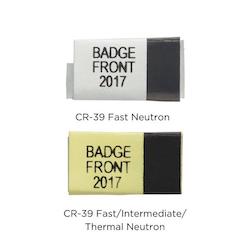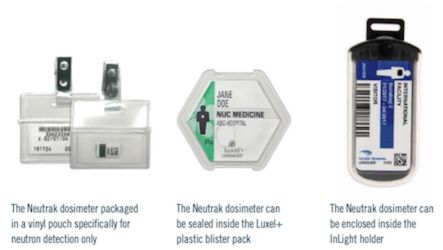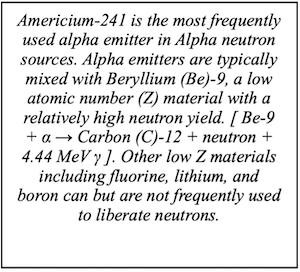
When Do You Need a Neutron Dosimeter?
The short answer is: that you need a neutron dosimeter when you are exposed to neutrons produced where you work. The long answer is: workers in nuclear facilities (e.g., nuclear power reactors), research labs, cancer treatment facilities, and industries where neutron sources are used need neutron dosimeters to monitor exposure levels. Neutron radiation can be a significant hazard in these environments, and dosimetry is needed to ensure that exposure limits are not exceeded.
Common Neutron Dosimeter Applications
Healthcare Settings: Neutrons can be produced by particle accelerators producing electrons or X-ray photons at voltages above 8 MV. Particle accelerators can also produce gamma rays, high-energy neutrons, and secondary protons that can activate materials (i.e., cause them to become radioactive). Activation occurs when the proton/neutron ratio of stable atoms is changed. Activated accelerator components, facility materials, dust, and room air can pose significant radiation risks. These risks, however, are temporary as activated materials typically have very short half-lives. Neutron dosimeters are crucial in these settings to monitor and manage radiation doses effectively.
- Radiation Protection Programs: Neutron dosimetry is a key component of radiation protection programs in industries where neutron sources are used, such as:
- Nuclear power and research reactors
- Military (i.e., nuclear weapons design, maintenance, and testing)
- Industrial radiography (i.e., non-destructive testing of materials for defects)
- Soil moisture/density testing (engineering and construction)
- Well logging (i.e., a process that uses neutron sources to determine the geological nature of wells and their ability to produce oil or natural gas)
- Cancer treatment (radiation therapy using particle accelerators)
- Research (physics and medicine)
- Gemstone irradiation (to enhance color)
- Emergency Response: In the event of a nuclear accident or emergency involving neutron radiation, first responders and emergency personnel need neutron detectors to assess exposure levels quickly and take appropriate protective measures and neutron dosimeters to measure personal neutron dose.
 Research and Development: Scientists and researchers working with neutron sources or conducting experiments involving neutron radiation require dosimeters to quantify and analyze personal and area neutron exposure levels. This information is vital for understanding the effects of neutron radiation and developing safety protocols.
Research and Development: Scientists and researchers working with neutron sources or conducting experiments involving neutron radiation require dosimeters to quantify and analyze personal and area neutron exposure levels. This information is vital for understanding the effects of neutron radiation and developing safety protocols.- Environmental Monitoring: Neutron dosimeters can also be used for environmental monitoring in areas where neutron sources are present or in restricted and unrestricted areas close to nuclear facilities. This helps assess potential risks to public health and the environment.
- Dosimetry Intercomparisons: Neutron dosimeters are often used in dosimetry intercomparisons to evaluate the performance of dosimetry systems, ensure the accuracy and reliability of measurements, and maintain quality assurance in radiation monitoring programs.
What is a Neutron Dosimeter?
Neutron dosimeters are specifically designed to measure exposure to neutron radiation. They are indispensable for effectively managing and assessing neutron radiation exposure across various environments such as occupational settings, medical facilities, research institutions, emergency response scenarios, and environmental monitoring programs. These devices are crucial for accurately measuring neutron radiation levels, thereby enabling the implementation of safety measures that minimize exposure risks, ensure regulatory compliance, and protect individuals from the harmful effects of neutron radiation.
The LANDAUER Neutrak® Fast Neutron dosimeter is a CR-39 (allyl diglycol carbonate) based dosimeter that can be packaged alone, for neutron detection only, or added as a component of another dosimeter such as Luxel®+ or InLight®.
 |
 |
Uncharged neutron particles can penetrate deeply into materials and biological tissues. Since water slows neutrons down and absorbs their energy, and our bodies are mostly water, neutrons are particularly harmful to human health.
Neutron Sources
 Nuclear power and research reactors
Nuclear power and research reactors- Particle accelerators operating above 8 MV
- Alpha neutron sources. Alpha emitters used in these neutron sources include Americium (Am)-241, Plutonium (Pu)-238, and Pu-239. Radium (Ra)-226 and Polonium (Po)-210 can but are not frequently used.
- Gamma neutron sources. If Hydrogen (H)-2 or Be-9 nuclei are sufficiently excited by gamma rays [e.g., from an Antimony (Sb)-124 source], neutrons can be ejected from the nucleus. Approximately one in a million gamma rays produce a neutron, and the gamma exposure rate from Sb-124 sources makes them a significant radiological hazard.
- Spontaneous fission sources. Some high-mass alpha-emitting radionuclides undergo spontaneous fission (e.g., Pu-238, Curium (Cm)-242, Cm-244, Cf-252). Each fission event produces two to four neutrons.
Key Takeaways
In occupational environments, neutron dosimeters help monitor radiation exposure to ensure it remains As Low As Reasonably Achievable (ALARA) and within permissible limits, safeguarding workers' health. In medical settings, they are essential for protecting healthcare providers, particularly during procedures involving neutron radiation, such as certain types of cancer treatments. Research institutions rely on neutron dosimeters to maintain safe working conditions for scientists and technicians working with neutron sources, while emergency responders use them to assess and manage radiation exposure during nuclear incidents.
Moreover, neutron dosimeters play a vital role in environmental monitoring programs by providing data on background radiation levels, which is crucial for assessing the impact of nuclear facilities on surrounding areas. The versatility of neutron dosimeters such as LANDAUER Neutrak® allows them to be used in diverse settings, offering precise and reliable measurements even in challenging conditions.
By ensuring accurate dose assessments, neutron dosimeters contribute to a comprehensive understanding of radiation exposure, facilitating the development of effective radiation protection programs. This capability is essential for advancing research, improving safety protocols, and enhancing the overall management of neutron radiation risks in various fields.

